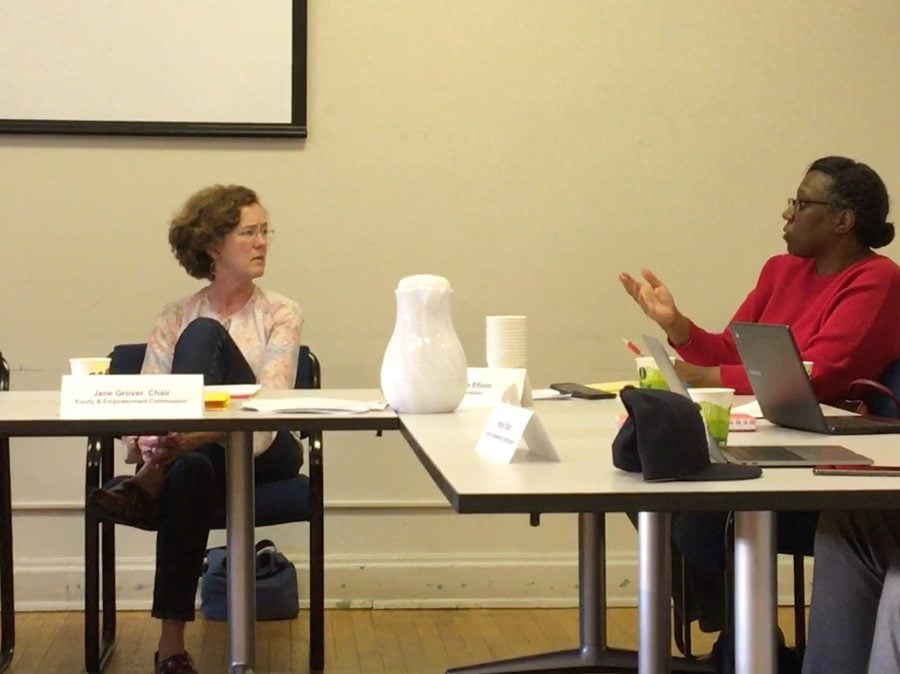Equity and Empowerment Commission works toward reconciliation, reparations through interactive redlining exhibit
Clare Proctor/Daily Senior Staffer
Equity and Empowerment Commission members speak at Thursday’s meeting. The commission voted unanimously to sponsor bringing an interactive exhibit to Evanston that discusses the persistent effects of redlining in Evanston.
May 17, 2019
The Evanston Equity and Empowerment Commission voted unanimously at a Thursday meeting to sponsor the Undesign the Redline exhibit visit to Evanston.
Undesign the Redline is a travelling interactive exhibit connecting systemic housing discrimination policies from the 1930s to issues still present today stemming from redlining, the discriminatory refusal to provide housing loans to racial minorities, particularly black families. The commission’s decision to sponsor the $1,500 exhibit allows the commission to advocate for bringing the exhibit to Evanston, though it doesn’t pledge money to pay for the installation of the exhibit, said commission chair Jane Grover.
Patricia Efiom, the city’s equity and empowerment coordinator, said Undesign the Redline would fit into the commission’s work to provide reconciliation and reparations to the community for historic and ongoing inequities.
“It looks to unveil to the whole community the racism that exists in that community,” Efiom said. “And then once you bring that forth from there, it sparks of conversations around it. It’s a process, a reconciliation process.”
The exhibit is available from mid-June to mid-October, Grover said, but the commission has inquired about extending it through mid-November in hopes of bringing it to Evanston residents.
The commission discussed resolutions from different city officials on how to conduct programming to facilitate racial reconciliation. Ald. Cicely Fleming (9th) had previously presented a resolution to hold a day of healing in Evanston, and former 5th Ward alderman Delores Holmes proposed a movement led by the commission to promote reconciliation in the community.
Commission member Monté Dillard said the city’s goals through reconciliation and reparations programming must be made explicit to residents. The commission discussed the importance of ensuring residents know about issues of disparity in the city and have meaningful programming over an extended period of time.
“Being really clear about what exactly the process looks like is really key,” Dillard said. “We don’t want to let the narrative be creative.”
Addressing the information gap is an important part of the healing process, Dillard said. He recommended financial literacy and business planning programs to help bridge that gap.
Grover said she wants to ensure that the commission is involved in the city’s efforts to host reconciliation and reparations programming. The commission plans to further discuss it at its next meeting June 20.
Evanston Public Library director Karen Danczak Lyons also updated the commission on the library’s Racial Equity Task Force. The task force aims to offer feedback and recommendations to better facilitate diversity, equity and inclusion into EPL’s services. The library has already received 18 applications to join the task force, Danczak Lyons said, but she and other EPL staff members are working to continue circulating the application to include voices with diverse lived experiences.
Danczak Lyons said EPL’s racial equity work needs to go “hand-in-hand” with the work the Equity and Empowerment Commission is doing to address inequities in the city.
“We’re looking at the language to make sure we’re not putting up any barriers… to try and cast a wide net, to be welcoming and inclusive,” Danczak Lyons said.
Email: c[email protected]
Twitter: @ceproctor23


